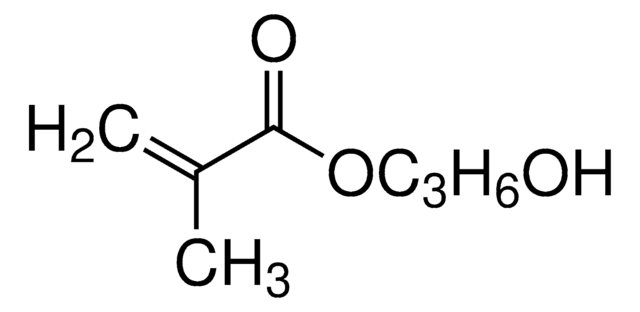17348
2-Hydroxyethyl methacrylate
embedding medium (for microscopy)
Synonym(s):
1,2-Ethanediol mono(2-methylpropenoate), Glycol methacrylate, HEMA
About This Item
Recommended Products
grade
embedding medium (for microscopy)
vapor density
5 (vs air)
vapor pressure
0.01 mmHg ( 25 °C)
Assay
≥99%
form
liquid
contains
~0.001% hydroquinone monomethyl ether as stabilizer
impurities
<250 mg/kg free acid (as methycrylic acid) (T)
refractive index
n20/D 1.453 (lit.)
n20/D 1.453
bp
67 °C/3.5 mmHg (lit.)
density
1.071 g/mL at 20 °C
1.073 g/mL at 25 °C (lit.)
storage temp.
2-8°C
SMILES string
CC(=C)C(=O)OCCO
InChI
1S/C6H10O3/c1-5(2)6(8)9-4-3-7/h7H,1,3-4H2,2H3
InChI key
WOBHKFSMXKNTIM-UHFFFAOYSA-N
Looking for similar products? Visit Product Comparison Guide
Application
Signal Word
Warning
Hazard Statements
Precautionary Statements
Hazard Classifications
Eye Irrit. 2 - Skin Irrit. 2 - Skin Sens. 1
Storage Class Code
10 - Combustible liquids
WGK
WGK 1
Flash Point(F)
222.8 °F - closed cup
Flash Point(C)
106 °C - closed cup
Personal Protective Equipment
Certificates of Analysis (COA)
Search for Certificates of Analysis (COA) by entering the products Lot/Batch Number. Lot and Batch Numbers can be found on a product’s label following the words ‘Lot’ or ‘Batch’.
Already Own This Product?
Find documentation for the products that you have recently purchased in the Document Library.
Customers Also Viewed
Our team of scientists has experience in all areas of research including Life Science, Material Science, Chemical Synthesis, Chromatography, Analytical and many others.
Contact Technical Service















